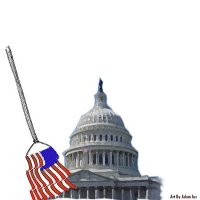One point I keep making regarding my
“open source thesis” is that, on matters regarding the Internet,
Left Blogistan and Right Blogistan agree. (Art by Adam Fox, originally printed at Down with Tyranny.)
Both sides support network neutrality.
Both sides want campaign reformers to keep their hands off the Net.
Both cheered today’s California decision expanding the rights of
bloggers
who repeat what turn out to be lies.
But in the wake of the latest election
results, another area of agreement has emerged. Both sides are
against corruption, and ready to do battle with their own “side”
in order to “purify” the ranks.
Conservatives like Dean Barnett at
Townhall.Com
are unhappy over the Republicans’ House leadership choices. They seem
a continuation of the arguably “pro-corruption” meme that cost
those leaders power in the first place. Rather than merely parrot the
Republican Party line, bloggers like Captain’s Quarters now want to
be more like DailyKos,
raising money and taking on their own side.
Democrats like Howie Klein have their
own corruption worries. In a recent post he offers sympathy for those
Republicans upset with their House leadership
and in another demands that Democratic bloggers go after the corrupt
members in their own ranks, no matter how powerful.
This is a significant moment.
Mainstream reporters like David Ignatius have tried to enter the
blogosphere
but they have been mainly jeered
because they are spouting Washington-received conventional wisdom.
Fools like the people who run the
National Journal Blogometer
have never understood this, and perhaps never will. (Neither does
MSNBC.)
Most popular bloggers don’t live in Washington, and most don’t want to. They
impact Washington without setting foot in the place.
Imagine, politics happening outside
Washington. That’s the source of the basic disconnect between the
blogosphere on the one hand and the media-political-business elites
they contend with. And it’s a split that exists regardless of whether
we’re talking about conservative or liberal bloggers.
So long as this continues, so long as
the most popular bloggers avoid the trappings of money and fame, so
long as the readers of blogs remain vigilant and learn to ignore
those who are corrupted, the blogosphere will remain in favor of
reform.
The blogosphere, in other words, can
become a permanent check on power.












